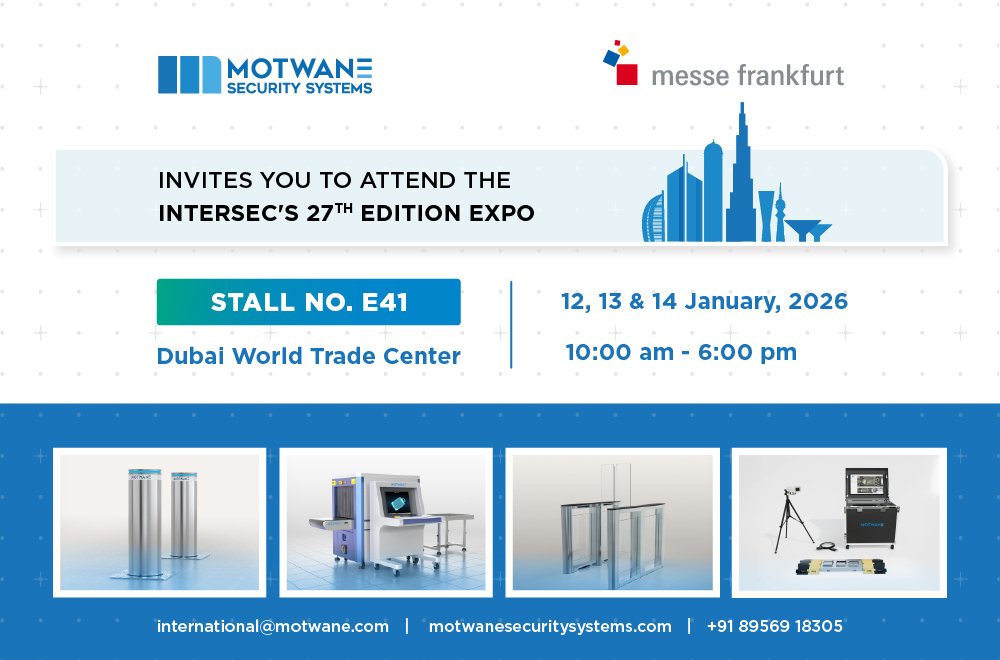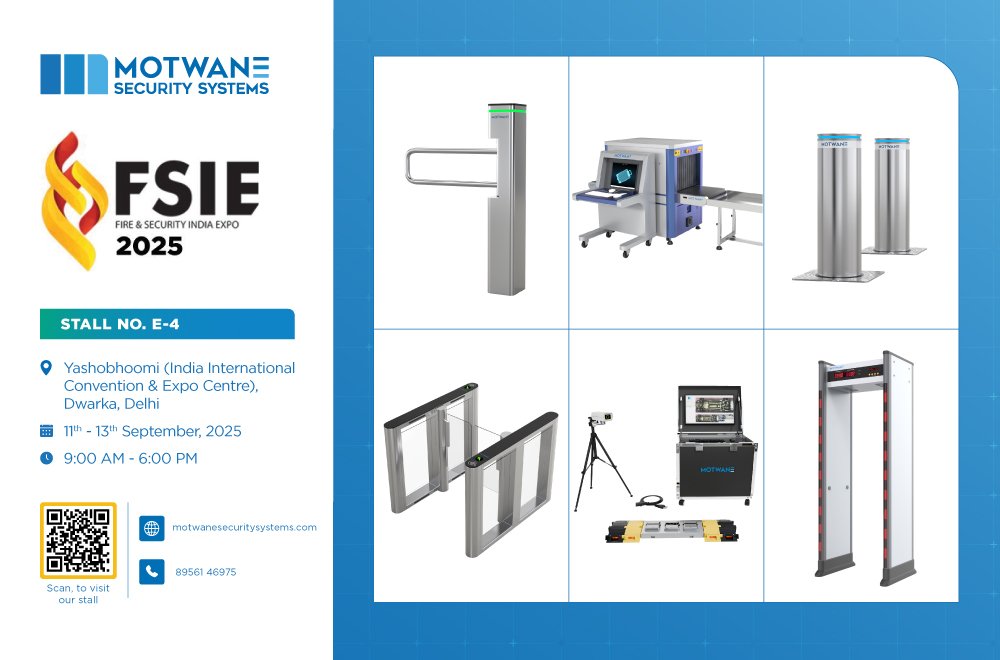
Motwane Security Systems at PACC 2026
Motwane Security Systems is proud to announce its participation in PACC 2026, scheduled to take place from 26th
Ensuring Human Safety and Security is at the forefront of modern India. Therefore, we remain committed in our vision to provide class leading Entrance Control Solutions
Designed and built in Maharashtra in adherence with the AERB radiation safety norms and global standards.
Enhance security with Motwane's Hydraulic Bollards – durable, automated solutions designed to safeguard critical spaces, control vehicle access, and provide unmatched protection for high-risk areas.
Ensuring Human Safety and Security is at the forefront of modern India. Therefore, we remain committed in our vision to provide class leading Entrance Control Solutions

Designed and built in Maharashtra in adherence with the AERB radiation safety norms and global standards.

Enhance security with Motwane’s Hydraulic Bollards – durable, automated solutions designed to safeguard critical spaces, control vehicle access, and provide unmatched protection for high-risk areas.

Motwane Security Systems stands as a leader in the security industry, renowned for its innovative approach to addressing the evolving challenges of modern security requirements. The company specializes in developing advanced solutions that cater to diverse applications, including access control systems, hydraulic bollards, under-vehicle surveillance systems (UVSS), road blockers, flap barriers, boom barriers and other high-performance security products.
With a strong emphasis on technological sophistication and adaptability, Motwane Security Systems ensures its offerings meet the unique demands of various sectors, including government, corporate, and residential clients. Driven by a commitment to excellence and a deep understanding of client-specific challenges, the company delivers reliable, scalable, and customized solutions designed to safeguard critical assets effectively. Their customer-focused approach ensures each product and system is meticulously engineered to deliver comprehensive security and unmatched reliability in today’s complex threat environment.

Motwane Security Systems is proud to announce its participation in PACC 2026, scheduled to take place from 26th

Motwane Security Systems at Intersec Dubai 2026 Join Us at Dubai World Trade Centre | 12–14 January 2026

Motwane Security Systems Showcases the Future of Safety at FSIE 2025 Motwane Security Systems is proud to announce
Whether your products fall under warranty agreements, or you have signed up for Motwane’s Maintenance Program, our team is readily available for you!

Customers choose to partner with us due to our meticulous attention to detail and exceptional customer service. We are committed to delivering tailored solutions that precisely address the unique needs of each client.
In a market fragmented with local traders and importers, Motwane prides itself on walking the extra mile. Putting our customers and their user experience always first, Motwane’s products are the result of continuous R&D around actual use cases and requirements.
The Motwane brand provides its customers with the trust and reliability of a 100-year-old organization. Our company’s rich history dates back to India’s Freedom Movement, reflecting our deep-rooted commitment to quality and service that has stood the test of time.
At Motwane, we proudly own all the technology which is integrated in our products. This important step ensures that our teams are able to steer the entire value chain from product ideation to final production by keeping our customers and their needs on highest priority.
We believe in the importance of creating an ‘Atma Nirbhar Bharat’, India’s answer to being self-reliant. Empowered with a robust supply chain, Motwane’s manufacturing facility located in Nashik, Maharashtra, has become a leading hub of local employment and procurement in the region.


























Access control systems are security solutions designed to manage and regulate entry to specific areas or resources. These systems can include RFID gate access control systems, which utilize radio frequency identification technology to allow or deny access based on authorized credentials. Physical access control systems encompass various methods such as key cards, biometric scanners, and traditional locks. By combining these technologies, organizations can enhance their security measures, ensuring only authorized individuals gain entry while monitoring and managing access effectively.
There are various types of gates and barriers: including swing gates, sliding gates, barriers, bollards, and automatic gates, each suited for specific security needs.
Security gate entry systems are sophisticated solutions designed to control and monitor access to restricted areas. These systems typically include security gates, which can be automated or manual, to ensure that only authorized personnel can enter a property. Security gate companies provide various options tailored for businesses, including security gates for business applications, which enhance safety and deter unauthorized access.
These systems often incorporate advanced security gate access control systems, allowing for seamless entry via key cards, biometric scans, or remote controls. With security gate control systems in place, businesses can effectively manage and track who enters and exits their premises, enhancing overall security. Additionally, security access gates are essential components of broader security access systems that may include surveillance cameras and alarm systems.
Incorporating reliable security equipment access control is vital for protecting sensitive areas and ensuring the safety of employees and assets. By utilizing a comprehensive security gate entry system, businesses can bolster their security measures and create a safer environment.
Security access control systems are essential technologies designed to manage and regulate entry to restricted areas within a facility. These systems encompass various components, including
that safeguard entrances and exits, ensuring only authorized individuals gain access.
Access security gates play a pivotal role in this framework, often integrating with security entry systems to provide a seamless experience for authorized users. These access automatic gates can operate via key cards, biometric scans, or other identification methods, enhancing security and efficiency.
Moreover, access security systems utilize access control system devices to monitor and log entry attempts, providing valuable data for security audits. By implementing robust security access control systems, organizations can effectively protect their assets, ensure compliance with regulations, and maintain a secure environment for their personnel and visitors.
Pedestrian gate access control involves systems specifically created to oversee and regulate the movement of individuals entering and exiting through designated pedestrian gates. These systems ensure that only authorized personnel can access certain areas, enhancing security and safety in various environments, such as corporate offices, public buildings, and residential complexes.
Typically, pedestrian gate access control systems utilize various technologies, including RFID cards, keypads, biometric scanners, or mobile access applications. These technologies allow for efficient identification and verification of individuals before granting access.
Integration with automated access gates enhances the overall security framework by creating a seamless flow of movement. Automated access gates can be programmed to work in conjunction with pedestrian access control systems, allowing for synchronized operations. For instance, once a pedestrian’s identity is verified through the access control system, the automated gate can unlock and open, permitting entry. This integration not only improves security but also streamlines pedestrian traffic, reducing waiting times and enhancing user experience.
By combining pedestrian gate access control with automated access gates, organizations can create a comprehensive security solution that effectively manages both pedestrian and vehicle entry, ensuring a safe and controlled environment.
A security entrance system is a sophisticated setup designed to control access to a building or restricted area. These systems often include a combination of physical barriers, such as security gates and turnstiles, alongside advanced technology, including biometric scanners, RFID readers, and surveillance cameras. By integrating these elements, security entrance systems effectively manage who can enter or exit a facility.
The importance of security entrance systems cannot be overstated. They play a critical role in safeguarding property and personnel from unauthorized access and potential threats. By regulating entry points, these systems help prevent theft, vandalism, and other criminal activities. Additionally, Security automated gate company like Motwane enhances the overall security posture of an organization by ensuring compliance with safety regulations and policies.
Moreover, security entrance systems contribute to a safe environment by monitoring foot traffic and providing data that can help in emergency situations. They also improve the flow of authorized personnel, reducing bottlenecks and enhancing operational efficiency. In summary, a security entrance system is vital for protecting assets, ensuring safety, and maintaining an organized and secure environment.

WhatsApp us
To download file, please fill the form below.
To download file, please fill the form below.
To download file, please fill the form below.
To download file, please fill the form below.
To download file, please fill the form below.
To download file, please fill the form below.
To download file, please fill the form below.
To download file, please fill the form below.
To download file, please fill the form below.
To download file, please fill the form below.
To download file, please fill the form below.
To download file, please fill the form below.
To download file, please fill the form below.
To download file, please fill the form below.
To download file, please fill the form below.
To download file, please fill the form below.
To download file, please fill the form below.
To download file, please fill the form below.
To download file, please fill the form below.
To download file, please fill the form below.
To download file, please fill the form below.
To download file, please fill the form below.
To download file, please fill the form below.
To download file, please fill the form below.
To download file, please fill the form below.
To download file, please fill the form below.
To download file, please fill the form below.
To download file, please fill the form below.
To download file, please fill the form below.
To download file, please fill the form below.
To download file, please fill the form below.
To download file, please fill the form below.
To download file, please fill the form below.
To download file, please fill the form below.
To download file, please fill the form below.
To download file, please fill the form below.
To download file, please fill the form below.
To download file, please fill the form below.
To download file, please fill the form below.

